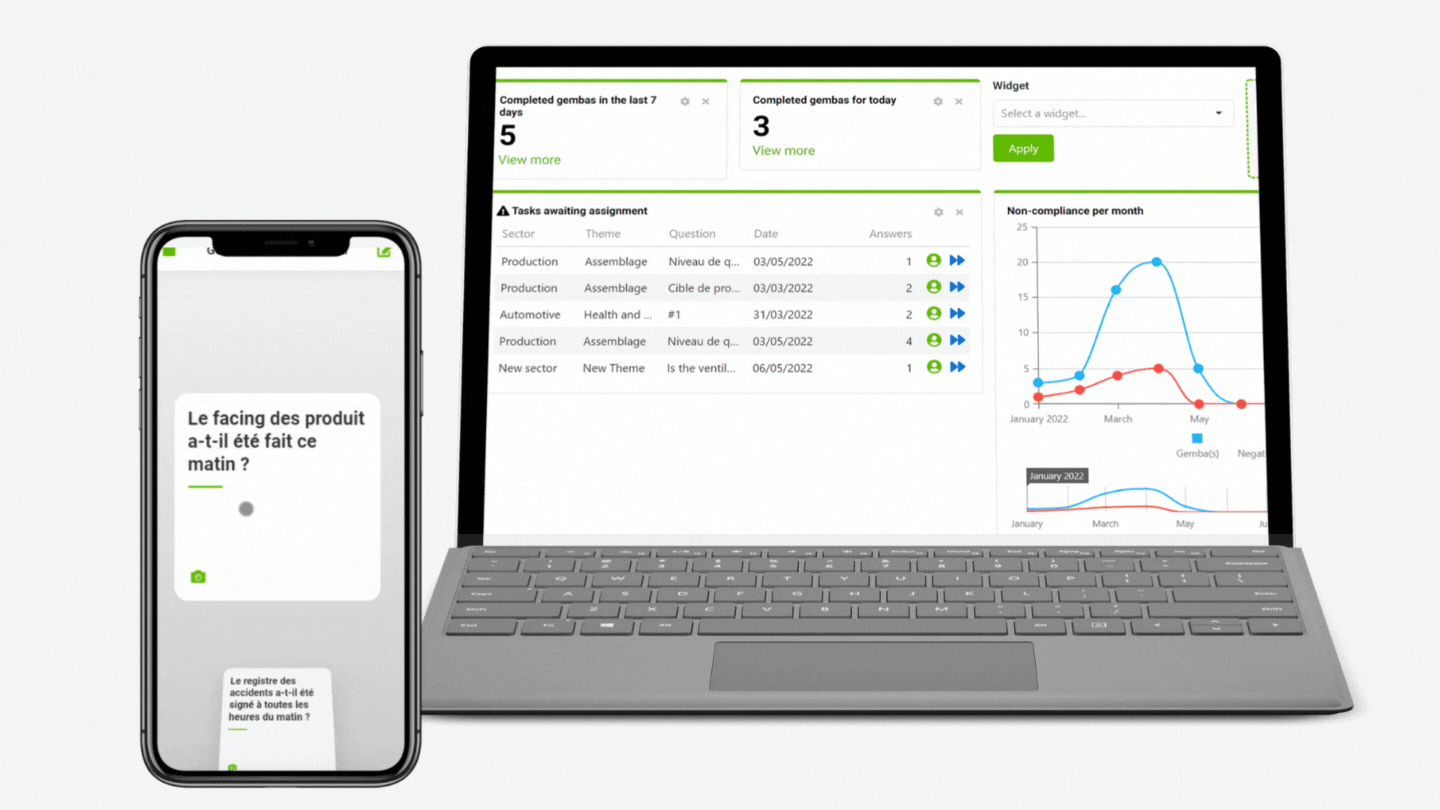
Gembawalk is a powerful application for continuous process improvement.
Increase efficiency and reduce waste by digitizing your gemba-walk lean management with a digital checklist. Efficiently document issues with a cloud management app, a virtual gemba-walk app! Works on all mobile devices!
You can also let this lean management philosophy influence your interview questions for better results and better candidates.
Gemba Walk is a powerful application and a powerful tool that allows for a continuous improvement process.
Our solution can help you:
Remove barriers between leadership and workers
Increase productivity and efficiency
Save time and reduce waste
Reduced data collection time
Thoroughly documented issues
Quick assessment and problem solving
Lean Management in the cloud.
All of your data is saved and secured in the Cloud using the latest technology allowing you and your team to obtain precise and adapted statistics and insight from your workers and team leader in real time at all times on a daily basis.
Easy and efficient data collection in a paperless environment usable at any level of management
Important Features
Generate exhaustive reports Work online or offline Capture and annotate photos with every relevant information (date-time) about the issue and have a better visibility on issues
Help identify problems in every area:
Better identification of people and processes and direct observation of the work happening.
- Management and direction
- Safety
- Production
- Human resources
- And many more!
For all sectors of activity:
- Industrial
- Food
- Hotels and restaurants
- Construction
- Retail businesses
- Agriculture
- Health
What is a Gemba Walk and the Gemba process?
Gemba is English for Genba, a Japanese word meaning “the actual place”. In terms of lean manufacturing and lean management, Gemba is the action of walking the workplace, usually the factory floor, and using a standardized checklist to take notes destined to improve work processes and find other opportunities for improvement. It is a fact-based technique that relies on observation instead of report analytics to increase productivity and safety.
Doing Gemba Walks on the manufacturing floor in the manufacturing industry is a great way to encourage employee and team involvement and create respect between managers and workers.
It also gives you operational control over your daily operations, manufacturing operations and manufacturing processes.
What is Lean Six Sigma and how does it go hand in hand with Gemba Walk?
Lean Six Sigma is an integrated managerial concept combining Lean and Six Sigma. Lean traditionally focuses on reducing the eight types of waste (“muda”) and Six Sigma focuses on identifying and removing the causes for defects (“errors”) and minimizing variability in processes. It’s a key part of Gemba Walk.
Lean Six Sigma uses DMAIC (Define, Measure, Analyze, Improve, Control) similar to that of Six Sigma. The five phases used by Lean Six Sigma aim to find the root causes of inefficiencies and then work with any process, products, or services that have a lot of data or measurable characteristics.
There are different levels for certifications, which are broken down into belt colors (white, yellow, green and black). A black belt signifies a deep understanding of Lean Six Sigma principles Below the black belt there are the green and yellow belts. Each of these belts has a set of skills that describes which of the overall Lean six sigma tools are expected to be used at a particular belt level.
The skillsets reflect elements from Six Sigma and Lean, as well as other process improvement methods like Theory of Constraints and Total Productive Maintenance. To achieve any of the certification level, a proctored test must be passed that asks about Lean Six Sigma and its applications. This is, in essence, the application of the Gemba Walk.
What is the waste (muda)?
Waste (muda) as defined by the former chairman of Toyota, Fujio Cho, is “anything other than the minimum amount of equipment, materials, parts, space, and workers time, which are absolutely essential to add value to the product”.
Downtime is a mnemonic for different types of waste and offers a schematic for Gemba Walk:
- Defects: When a product is declared unfit for use and must be either scrapped or re-worked, it costs the company time and money to fix. Examples include products that are damaged during the production process or incorrectly assembled because of unclear instructions.
- Over production: Over production or Excess production refers to products made in excess of what is needed. Examples include creating unnecessary reports and overproducing a product before a customer requests it.
- Waiting: Waiting involves delaying certain process steps and is divided into two different categories: Waiting for materials and equipment and idle equipment. Examples include waiting for approval from a supervisor, waiting for a reply to an email, waiting for materials to arrive, and slow or faulty machines.
- Non-Used Talent: Non-Used Talent refers to the waste of human potential and skill. The main cause is segregation between management and employees. When this happens, employees aren’t given the chance to offer feedback and suggestions to managers in order to help improve the process flow and productivity suffers. Examples include poorly trained staff, lack of incentives for staff, and putting staff into jobs or positions that don’t use all of their knowledge and skills.
- Transportation: Transportation is moving things from one place to another without using any energy. Transportation adds no value and can cause product damage and defects. Examples include moving products from one functional area to another and sending overstocked items back to an outlet warehouse for sale.
- Inventory: An inventory is any product or material that has not been processed yet. It’s a problem because the product could become obsolete before the customer needs it, which would mean storing the inventory costs the business time and money, and there’s a chance for damage and defects to increase over time. Examples include excess finished products, finished products that cannot be sold, or broken machines on the manufacturing floors.
- Movement: Movement is unnecessary movement by people Excessive movement wastes time and increases the risk of injury. Examples include walking to fetch tools, reaching for materials and walking to different parts on the manufacturing floor to complete various tasks.
- Extra-processing: Extra-processing or Over-processing is doing too much work than is required or needed to complete a task. Examples include data duplication, superfluous steps in production, superfluous product customization, as well as using more specialized equipment than necessary.
Testimonials





Our partners
Gemba walk is the result of the collective efforts of a group of experts from different fields in order to offer you a complete solution that exceeds your expectations.
A formidable combination in the achievement of objectives.

- © Gemba-Walk - All rights reserved
- Site map
- Privacy policy




